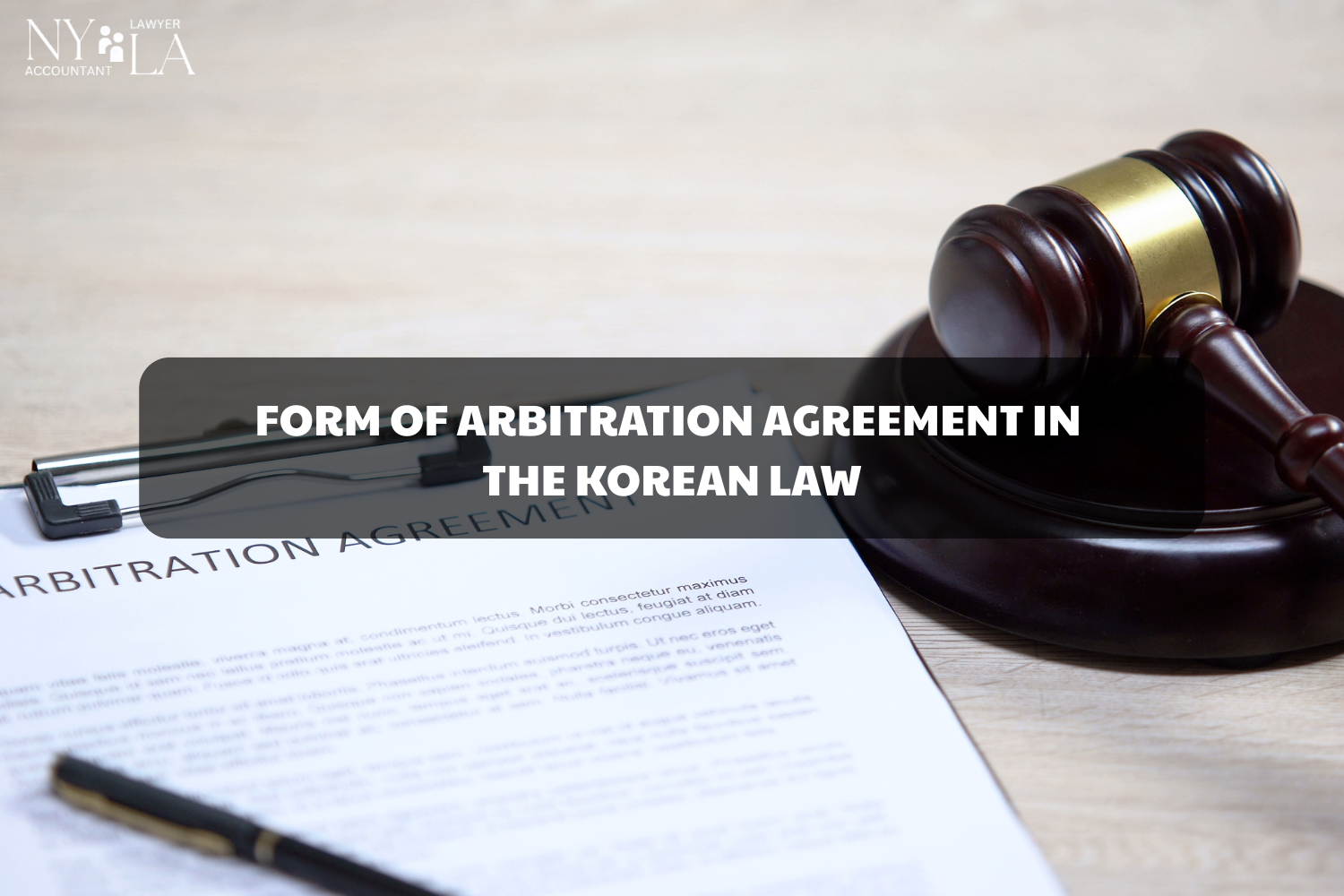Summary
- 1. Introduction to Arbitration Agreement in Korean Law
- 2. What Is an Arbitration Agreement?
- 3. Legal Basis of Arbitration Agreement in Korea
- 4. Forms of Arbitration Agreement under Korean Law
- 5. When Is an Arbitration Agreement Considered “Written”?
- 5.1 Recorded Agreement
- 6. Importance of a Valid Arbitration Agreement in Business
- 7. Common Mistakes to Avoid in Drafting an Arbitration Agreement
- 8. Enforceability of Arbitration Agreements in Korea
- 9. Conclusion: Why Every Cross-Border Contract Should Include an Arbitration Agreement
- 10. About NYLA – Korean Legal Office
1. Introduction to Arbitration Agreement in Korean Law
In the modern legal landscape, the arbitration agreement plays a pivotal role in resolving disputes outside of traditional court proceedings. Under Korean law, the framework for such agreements is defined by the Arbitration Act, which provides a solid legal basis for parties seeking alternative dispute resolution. This article explores in detail the concept, form, and enforceability of an arbitration agreement within the context of Korean legislation.
2. What Is an Arbitration Agreement?
An arbitration agreement is a legally binding contract where parties agree to resolve their disputes through arbitration rather than litigation. According to the Korean Arbitration Act, arbitration is defined as a procedure used to settle disputes over property rights or rights based on non-property interests that are legally negotiable and can be resolved through reconciliation.
An arbitration agreement may cover:
-
Disputes that have already arisen, or
-
Disputes that may arise in the future, and applies to clearly defined legal relationships, whether contractual or not.
The primary benefit of entering into an arbitration agreement is the ability to avoid lengthy and often costly court proceedings, opting instead for a private, neutral, and more flexible forum.
3. Legal Basis of Arbitration Agreement in Korea
The legal foundation for an arbitration agreement in Korea is the Arbitration Act, which aligns closely with international standards, particularly the UNCITRAL Model Law on International Commercial Arbitration. The Act provides clear definitions and outlines the essential requirements for a valid arbitration agreement, including the form, content, and situations where such an agreement is deemed to exist.
By incorporating an arbitration agreement, parties ensure that any conflict arising from their relationship can be handled effectively, reducing legal uncertainty and increasing procedural efficiency.

4. Forms of Arbitration Agreement under Korean Law
4.1 Separate Arbitration Agreement vs. Arbitration Clause
Under Korean law, an arbitration agreement can take two main forms:
-
A separate agreement, where the arbitration terms are outlined in a standalone document.
-
An arbitration clause embedded within a broader contract, such as a commercial or employment agreement.
Both forms are equally valid, provided they meet the legal requirements under the Arbitration Act.
4.2 Requirement of Written Form
For an arbitration agreement to be legally recognized in Korea, it must be in writing. This written requirement is fundamental and ensures clarity, certainty, and enforceability. The law provides several ways in which this writing requirement can be satisfied, even if the agreement was not originally documented in a traditional signed contract.
5. When Is an Arbitration Agreement Considered “Written”?
According to the Korean Arbitration Act, the following situations fulfill the requirement of a written arbitration agreement:
5.1 Recorded Agreement
If the terms of an arbitration agreement are recorded—regardless of whether the agreement was made orally, through conduct, or other informal means—it is deemed a written agreement. What matters is that the content is recorded and verifiable.
5.2 Communication Through Electronic Means
A written arbitration agreement also exists when parties exchange communications—such as telegrams, emails, telexes, faxes, or any other form of electronic communication—that clearly demonstrate their intent to resolve disputes through arbitration. However, such communication must be verifiable in terms of the agreement’s terms and conditions.
5.3 Uncontested Assertion of Arbitration Clause
When one party asserts that a written application or response exchanged between them includes an arbitration agreement, and the other party does not object, the agreement is legally recognized.
5.4 Reference to External Documents
If a contract refers to another document containing an arbitration clause, and that clause forms an integral part of the contract, then an arbitration agreement is deemed to exist, even if the clause is not restated within the primary contract.
6. Importance of a Valid Arbitration Agreement in Business
Businesses operating in Korea or with Korean partners increasingly include arbitration agreements in their contracts to ensure smooth resolution of future disputes. A well-drafted arbitration agreement provides certainty, enforces neutrality, and allows for international enforceability of arbitral awards under the New York Convention, to which Korea is a signatory.
Moreover, arbitration procedures are typically faster and more confidential than court litigation, offering significant advantages, especially in high-stakes commercial relationships.
7. Common Mistakes to Avoid in Drafting an Arbitration Agreement
While drafting an arbitration agreement, parties should avoid vague language, failure to specify the scope of arbitration, or omitting the applicable rules (e.g., Korean Commercial Arbitration Board – KCAB). Mistakes in form or content can render an arbitration agreement unenforceable, leading to delays and potential litigation.
Key elements to include:
-
The governing law
-
The seat of arbitration
-
The arbitration institution (e.g., KCAB, ICC)
-
Number and method of selecting arbitrators
-
Language of proceedings
8. Enforceability of Arbitration Agreements in Korea
Once an arbitration agreement meets the legal criteria set forth in the Arbitration Act, Korean courts are bound to respect and enforce it. This means that if one party tries to initiate court proceedings in breach of the arbitration clause, the court will typically dismiss the case and refer the parties to arbitration, as per Article 9 of the Arbitration Act.
This enforceability adds a layer of legal security and strengthens the credibility of arbitration as a preferred dispute resolution mechanism in Korea.
9. Conclusion: Why Every Cross-Border Contract Should Include an Arbitration Agreement
In conclusion, an arbitration agreement under Korean law provides a reliable and efficient way to resolve disputes. Whether in the form of a standalone contract or a clause within a broader agreement, a properly drafted arbitration agreement ensures legal certainty and procedural clarity.
With Korea’s modern Arbitration Act and support for international arbitration, businesses and individuals alike are encouraged to make arbitration agreements a standard component of their legal strategy.
10. About NYLA – Korean Legal Office

■ NYLA – Your Trusted Legal Partner in Korea
At NYLA, we understand that the success of foreign businesses in Korea requires not only a solid business strategy but also reliable legal support. With a team of experienced Korean attorneys and legal professionals, NYLA provides tailored legal services for companies, investors, and individuals operating or planning to establish a presence in Korea.
We support our clients throughout the entire business journey with comprehensive services, including:
- Legal consultation on company establishment, taxation, and immigration;
- Advice on commercial real estate, franchising, and product distribution;
- Support in human resources, marketing, and business strategy.
In addition to legal advisory, NYLA also represents clients in civil litigation cases related to business, labor, marriage, family, and inheritance to ensure their rights and interests are fully protected.
■ Contact NYLA

If you’re a foreign business or individual looking for a reliable legal partner in Korea, NYLA is here to help. We are committed to delivering effective, practical, and personalized legal solutions for every client.
With a proven track record of assisting hundreds of international clients, our team is equipped to help you navigate complex legal challenges—whether it’s commercial disputes, contract issues, or foreign investment guidance.
Don’t let legal matters hold you back. Let NYLA be your trusted guide in the Korean market.
■ Get in touch with NYLA for expert legal support
| Website: https://nylakoreanlegal.com/
FB: https://www.facebook.com/nyla.koreanlegal Tiktok: https://www.tiktok.com/@nylakoreanlegal Youtube: https://www.youtube.com/@NYLA-xd8qx Email: info.NYLAkoreanlegal@gmail.com SĐT: +82 10-3415-7859 |
 |






















































